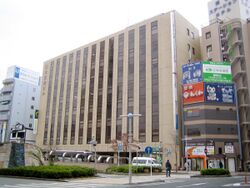Hamamatsu Photonics
Topic: Company
 From HandWiki - Reading time: 5 min
From HandWiki - Reading time: 5 min
 | |
 Headquarters of Hamamatsu Photonics | |
Native name | 浜松ホトニクス株式会社 |
|---|---|
| Type | Public KK |
| TYO: 6965 | |
| Industry | Electronics |
| Founded | (September 29, 1953) |
| Founder | Heihachiro Horiuchi |
| Headquarters | 325-6, Sunayama-cho, Naka-ku, Hamamatsu City, Shizuoka, 430-8587, Japan |
Key people | Teruo Hiruma (Chairman of the board) Akira Hiruma (President and CEO) |
| Products |
|
| Revenue | |
Number of employees | 4,420 (consolidated, as of December 19, 2014) |
| Footnotes / references [1] | |
Hamamatsu Photonics K.K. (浜松ホトニクス株式会社 Hamamatsu Hotonikusu Kabushiki-gaisha) is a Japanese manufacturer of optical sensors (including photomultiplier tubes), electric light sources, and other optical devices and their applied instruments for scientific, technical and medical use.[2][3]
The company was founded in 1953 by Heihachiro Horiuchi, a former student of Kenjiro Takayanagi, who is known as "the father of Japanese television".[4]
Hermann Simon, a leading German business author and thinker, mentioned Hamamatsu in his book titled Hidden Champions of the Twenty-First Century: The Success Strategies of Unknown World Market Leaders as an example of a "Hidden Champion".[2]
Hamamatsu CCD image sensors are used at the Subaru Telescope of the National Astronomical Observatory of Japan.[5]
Hamamatsu Photonics' photomultiplier tubes (PMTs) were designed specifically for the Super-Kamiokande neutrino detector facility at the University of Tokyo where 2015 Nobel Prize Laureate Takaaki Kajita conducted his research. In using products contributed by Hamamatsu Photonics, "Kajita was able to prove that neutrinos do in fact have mass -- a major shift in our fundamental understanding of how the universe works," said Tom Baer, chair of the Photonics Industry Neuroscience Group of the National Photonics Initiative. "This win is a tremendous accomplishment for Kajita and Hamamatsu Photonics."[6]
The sensors made by the company also helped confirm the existence of the Higgs boson in research that led to the 2013 Nobel Physics prize.[7]
References
- ↑ "Corporate Profile". Hamamatsu Photonics. http://www.hamamatsu.com/eu/en/hamamatsu/overview/profile/index.html. Retrieved February 16, 2015.
- ↑ 2.0 2.1 Simon, Hermann (June 10, 2009). "Chapter 1: The Mystique of the Hidden Champions". Hidden Champions of the Twenty-First Century: The Success Strategies of Unknown World Market Leaders. London: Springer Science+Business Media. p. 4. ISBN 978-0-387-98147-5.
- ↑ Resolved Instruments. "DPD80 Infrared Datasheet". https://resolvedinstruments.com/infrared-DPD80-photodetector-datasheet. "For more information on the photodiode please refer to part number g6854-01 in the hamamatsu datasheet ..."
- ↑ "Business club video:Hamamatsu". The Daily Telegraph. Telegraph Media Group. https://www.telegraph.co.uk/finance/businessclub/business-club-video/technology-sector-videos/11403646/hamamatsu.html. Retrieved February 16, 2015.
- ↑ "Hamamatsu CCD Sensors in Subaru Telescope in Hawaii". Novus Light Technologies Today. August 23, 2013. http://www.novuslight.com/hamamatsu-ccd-sensors-in-subaru-telescope-in-hawaii_N1537.html. Retrieved February 17, 2015.
- ↑ "National Photonics Initiative congratulates industry partner Hamamatsu on contributions to Nobel prize-winning research". SPIE. October 26, 2015. http://spie.org/x115957.xml. Retrieved February 15, 2016.
- ↑ Hasegawa, Toshiro (December 9, 2015). "Nobel prizes, unlocking universe’s mysteries just another day’s work at Hamamatsu Photonics". The Japan Times. http://www.japantimes.co.jp/news/2015/12/09/national/science-health/nobel-prizes-unlocking-universes-mysteries-just-another-days-work-hamamatsu-photonics/#.VsHHUa76tkh. Retrieved February 15, 2016.
External links
 KSF
KSF